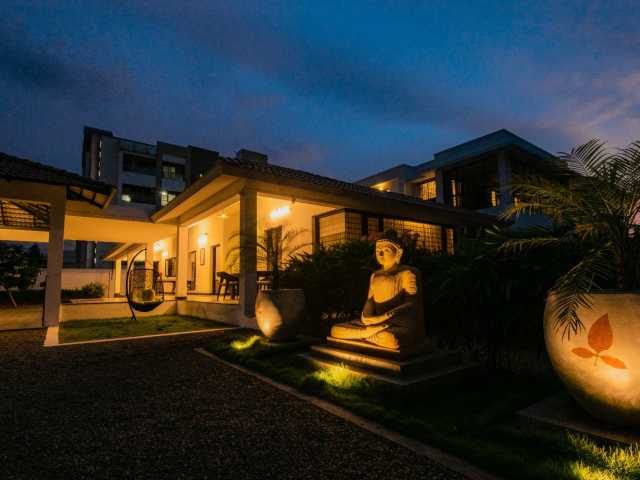








Abhasa Rehabilitation & Wellness Home - Exclusive Women Center
Verified Center
This provider's information has been quality-checked by Recovery.com's Research Team for accuracy and completeness, including center verification through appropriate third-party organizations.
Treatment Focus
This center treats substance use disorders and mental health conditions. You'll receive individualized care catered to your unique situation and diagnosis, learn practical skills for recovery, and make new connections in a restorative environment.
Primary Level of Care
Offering intensive care with 24/7 monitoring, residential treatment is typically 30 days and can cover multiple levels of care. Length can range from 14 to 90 days typically.
Treatment Focus
This center treats substance use disorders and mental health conditions. You'll receive individualized care catered to your unique situation and diagnosis, learn practical skills for recovery, and make new connections in a restorative environment.
Primary Level of Care
Offering intensive care with 24/7 monitoring, residential treatment is typically 30 days and can cover multiple levels of care. Length can range from 14 to 90 days typically.
Private Pay
You pay directly for treatment out of pocket. This approach can offer enhanced privacy and flexibility, without involving insurance. Exact costs vary based on program and length of stay. Contact the center for specific details.
Abhasa Rehabilitation & Wellness Home - Exclusive Women Center
Abhasa Rehabilitation & Wellness Home - Exclusive Women Center
About Abhasa Rehabilitation & Wellness Home - Exclusive Women Center
Abhasa Rehabilitation and Wellness Home's exclusive women's center blends empowerment and healing for addiction and mental health conditions. Here, women find a safe space to embark on their transformative journey towards renewed well-being. Abhasa’s tailored programs, compassionate support, and serene environment empower women to rise above challenges and embrace lasting recovery.
Personalized and Comprehensive Care
Abhasa believes in the power of tailored treatment plans. Their team uses clinical assessments and considers each client's unique history and circumstances to design an effective plan. Along with evidence-based, holistic, and alternative therapies, they blend dietary modifications, nature walks, meditation, cognitive behavioral therapy (CBT), and psychodynamic psychotherapy into each treatment plan. Neurofeedback brain training can enhance the recovery process by promoting self-regulation and optimizing brain function, fostering an effective and sustainable path to well-being. This personalized approach empowers clients to actively engage in their treatment journey, from detox to aftercare, and find success in the customized components.
Empathetic and Professional Team with Global Standards
At Abhasa Rehabilitation and Wellness Home, their compassionate and highly skilled team is the cornerstone of their commitment to providing exceptional care. Their handpicked professionals embody a genuine spirit of empathy, helping clients receive support and understanding throughout their healing journey. They take pride in maintaining international standards of excellence, infusing evidence-based practices and cutting-edge therapies into their treatment protocols. The team of experts continually stays abreast of the latest advancements in the field of addiction recovery and mental health to provide world-class care and treatment. Each member of their team is dedicated to creating a safe and nurturing environment, guiding clients towards renewed wellness and personal growth.
Diverse Range of Therapies and Treatments for Individual Needs
Abhasa offers a diverse array of therapeutic experiences. Clients can engage in reels Therapy (fishing), art and music therapy, movements therapy, massage therapy, family counseling, Progressive Muscle Relaxation Therapy (PMRT), and more. Their friendly therapy dogs provide companionship and joy, while outdoor activities like treks, fishing, bicycling, and birdwatching promote movement and connection with nature. Spa and yoga sessions offer meditative and relaxing experiences, while creative outlets like art, music, and pottery allow clients to express themselves and foster healing.

Highlights from the Center
Highlights
These highlights are provided by and paid for by the center.
Nature Lovers
On-site Spa
Neuro/Bio Feedback Therapy
Women Only
Center Overview
Treatment Focus
This center treats substance use disorders and mental health conditions. You'll receive individualized care catered to your unique situation and diagnosis, learn practical skills for recovery, and make new connections in a restorative environment.

Abhasa Rehabilitation & Wellness Home - Exclusive Women Center
Pricing and Program Length
Estimated Center Costs
The cost listed here (₹2,00,000 - ₹6,00,000 / $2,400 - $7,185 month), is an estimate of program cost. Center price can vary based on program and length of stay. Contact the center for more information. Recovery.com strives for price transparency so you can make an informed decision.




Other Abhasa Rehabilitation Centers
Recovery.com Verified Listing
Recovery.com verified that the name, location, contact information and license to operate for this treatment provider are valid and up-to-date.

Licensed
Recovery.com is an independent, third-party mental health resource. Verification does not imply endorsement and does not guarantee the quality of treatment services.
Meet Your Care Team

Mrs. Gayathri Arvind
Founder & Director
Philanthropist and Mental Health Advocate

Dr. Rohit Garg
Senior Consultant Psychiatrist
Best Doctor’s Award in India by Medi Health Magazine

Dr. Naveen Kumar V
Medical Director
Psychiatrist and MBBS

Dr Vivek Sharma
Consultant Psychiatrist and Neurofeedback
MBBS and MD (Psychiatry)
Your Care Options
Specializations
Schizophrenia
Schizophrenia is a serious mental health condition that causes hallucinations, delusions, and disordered thinking.
Personality Disorders
Personality disorders destabilize the way a person thinks, feels, and behaves. If untreated, they can undermine relationships and lead to severe distress.
Alcohol
Using alcohol as a coping mechanism, or drinking excessively throughout the week, signals an alcohol use disorder.
Depression
Symptoms of depression may include fatigue, a sense of numbness, and loss of interest in activities. This condition can range from mild to severe.
Eating Disorders
An eating disorder is a long-term pattern of unhealthy behavior relating to food. Most people with eating disorders have a distorted self-image.
Obsessive Compulsive Disorder (OCD)
OCD is characterized by intrusive and distressing thoughts that drive repetitive behaviors. This pattern disrupts daily life and relationships.
Women only
Women attend treatment in a gender-specific facility, with treatment delivered in a safe, nourishing, and supportive environment for greater comfort.
Who We Treat
Women only
Women attend treatment in a gender-specific facility, with treatment delivered in a safe, nourishing, and supportive environment for greater comfort.
Treatment Services
Detox
Detox fully and safely removes toxic substances from the body, allowing the next steps in treatment to begin with a clean slate.
Licensed Primary Mental Health
Some primary care providers offer mental health diagnosis and treatment. This can prevent patients from developing more serious conditions.
Outpatient
During outpatient rehab, patients attend a structured treatment program while continuing to live at home.
Residential
In a residential rehab program, patients live onsite, with access to daily treatment and 24-hour care. An average stay is 30-90 days.
Sober Living
These structured living environments help people transition out of rehab. Residents have more freedom than they do during rehab, but still follow certain rules.
Approaches
Family Involvement
Providers involve family in the treatment of their loved one through family therapy, visits, or both–because addiction is a family disease.
Holistic
A non-medicinal, wellness-focused approach that aims to align the mind, body, and spirit for deep and lasting healing.
Medical
Medical addiction treatment uses approved medications to manage withdrawals and cravings, and to treat contributing mental health conditions.
Personalized Treatment
The specific needs, histories, and conditions of individual patients receive personalized, highly relevant care throughout their recovery journey.
Strengths-Based
Providers using a strengths-based philosophy focus on the positive traits of their patients, creating a positive feedback loop that grows confidence.
Strengths-Based
Providers using a strengths-based philosophy focus on the positive traits of their patients, creating a positive feedback loop that grows confidence.
Therapies
1-on-1 Counseling
Patient and therapist meet 1-on-1 to work through difficult emotions and behavioral challenges in a personal, private setting.
Meditation & Mindfulness
A practiced state of mind that brings patients to the present. It allows them to become fully aware of themselves, their feelings, and the present moment.
Play Therapy
This approach is commonly used with children. It incorporates elements of play and self-expression, like boardgames, finger painting, dolls, and blocks.
Online Therapy
Patients can connect with a therapist via videochat, messaging, email, or phone. Remote therapy makes treatment more accessible.
Mindfulness Therapy
This ancient practice can be mental, emotional, and even spiritual. In meditation, you focus your attention on the present moment without judgement.
Adventure Therapy
This experiential approach uses the physical and emotional challenges of outdoor activities as tools for personal growth.
Attachment-Based Family Therapy
ABFT is a trauma-focused therapy that teaches you to form healthy relationships by rebuilding trust and healing attachment issues formed in childhood.
Animal Therapy
Animals can inspire trust and self-worth. In this experiential therapy, guided interactions are used to improve social skills and emotion regulation.
Aromatherapy
Inhaling or topically applying essential oils can help relieve stress, soothe pains, and relieve emotional distress.
Conditions We Treat
Pornography Addiction
A person with a porn addiction is emotionally dependent on pornography to the point that it interferes with their daily life and relationships.
Schizophrenia
Schizophrenia is a serious mental health condition that causes hallucinations, delusions, and disordered thinking.
Grief and Loss
Grief is a natural reaction to loss, but severe grief can interfere with your ability to function. You can get treatment for this condition.
Personality Disorders
Personality disorders destabilize the way a person thinks, feels, and behaves. If untreated, they can undermine relationships and lead to severe distress.
ADHD, ADD
ADHD is a common mental health condition caused by dopamine imbalance. Common symptoms include inattention, hyperactivitiy, and impulsivity.
Anger
Although anger itself isn't a disorder, it can get out of hand. If this feeling interferes with your relationships and daily functioning, treatment can help.
Anxiety
Anxiety is a common mental health condition that can include excessive worry, panic attacks, physical tension, and increased blood pressure.
Bipolar
This mental health condition is characterized by extreme mood swings between depression, mania, and remission.
Codependency
Codependency is a pattern of emotional dependence and controlling behavior. It's most common among people with addicted loved ones.
Substances We Treat
Alcohol
Using alcohol as a coping mechanism, or drinking excessively throughout the week, signals an alcohol use disorder.
Benzodiazepines
Benzodiazepines are prescribed to treat anxiety and sleep issues. They are highly habit forming, and their abuse can cause mood changes and poor judgement.
Chronic Relapse
Consistent relapse occurs repeatedly, after partial recovery from addiction. This condition requires long-term treatment.
Co-Occurring Disorders
A person with multiple mental health diagnoses, such as addiction and depression, has co-occurring disorders also called dual diagnosis.
Cocaine
Cocaine is a stimulant with euphoric effects. Agitation, muscle ticks, psychosis, and heart issues are common symptoms of cocaine abuse.
Drug Addiction
Drug addiction is the excessive and repetitive use of substances, despite harmful consequences to a person's life, health, and relationships.
Ecstasy
Ecstasy is a stimulant that causes intense euphoria and heightened awareness. Abuse of this drug can trigger depression, insomnia, and memory problems.
Heroin
Heroin is a highly addictive and illegal opioid. It can cause insomnia, collapsed veins, heart issues, and additional mental health issues.
Psychedelics
Hallucinogenic drugs—like LSD—cause euphoria and increased sensory experiences. When abused, they can lead to depression and psychosis.
Languages
Aftercare
Care Designed for Your Needs
Personal Amenities
Amenities
Special Considerations
Center Pets
Addiction and mental health facilities with pets allow patients to interact with friendly dogs, cats, horses, and in some cases, even dolphins.
Clients can bring their own pet(s)
For greater comfort and healing, pet-friendly treatment centers welcome dogs and animal companions to stay with their owners while they attend treatment.
Couples program
Using gentle clinical care, therapists guide patients and their partner through guided sessions to address issues and work towards lasting solutions.
Pet Friendly
For greater comfort and healing, pet-friendly treatment centers welcome dogs and animal companions to stay with their owners while they attend treatment.
Executive Program
Addiction and mental health treatment for executives typically involves high discretion, greater technology access, and more private, 1-on-1 care.
LGBTQ group
Group therapy unites LGBTQ+ patients in a safe and culturally competent setting, encouraging peer support under the expert leadership of a therapist.
Activities
Yoga
Yoga is both a physical and spiritual practice. It includes a flow of movement, breathing techniques, and meditation.
Off-Site Activities
Yoga
Yoga is both a physical and spiritual practice. It includes a flow of movement, breathing techniques, and meditation.
Off-Site Amenities

Learn More About the Center
What is Drug Addiction?
Learn about what drug addiction is and how it presents itself, and how treatment at Abhasa can help.
More About Abhasa
Read more about who Abhasa is, see their team, and see more of the therapies and services they offer during treatment.
Abhasa’s Photo Gallery
Browse through the featured photos and amenities of Abhasa’s Coimbatore location.
Rejuvenating Activities at Abhasa
See the plentiful activities Abhasa has to offer, like bird-watching, trekking, and pet therapy.
What people are saying
Treatment
4.9
Accommodations
4.9
Food & Nutrition
4.9
Value
5.0
Pros
- Family Program (3)
- Treated With Respect (3)
- Beautiful Location (3)
- Supportive Aftercare (3)
Kalyani
Treatment in 2023 • (30 days) • Reviewed 08/03/23
Former Client
Gayathri
Treatment in 2023 • (60 days) • Reviewed 08/06/23
Loved One of a Former Client
Arul
Treatment in 2023 • (60 days) • Reviewed 01/20/24
Former Client
•Businesses
Nithya
Treatment in 2023 • (30 days) • Reviewed 12/27/23
Loved One of a Former Client
•Developer
Pugal
Treatment in 2023 • (60 days) • Reviewed 12/18/23
Former Client
•Staff





